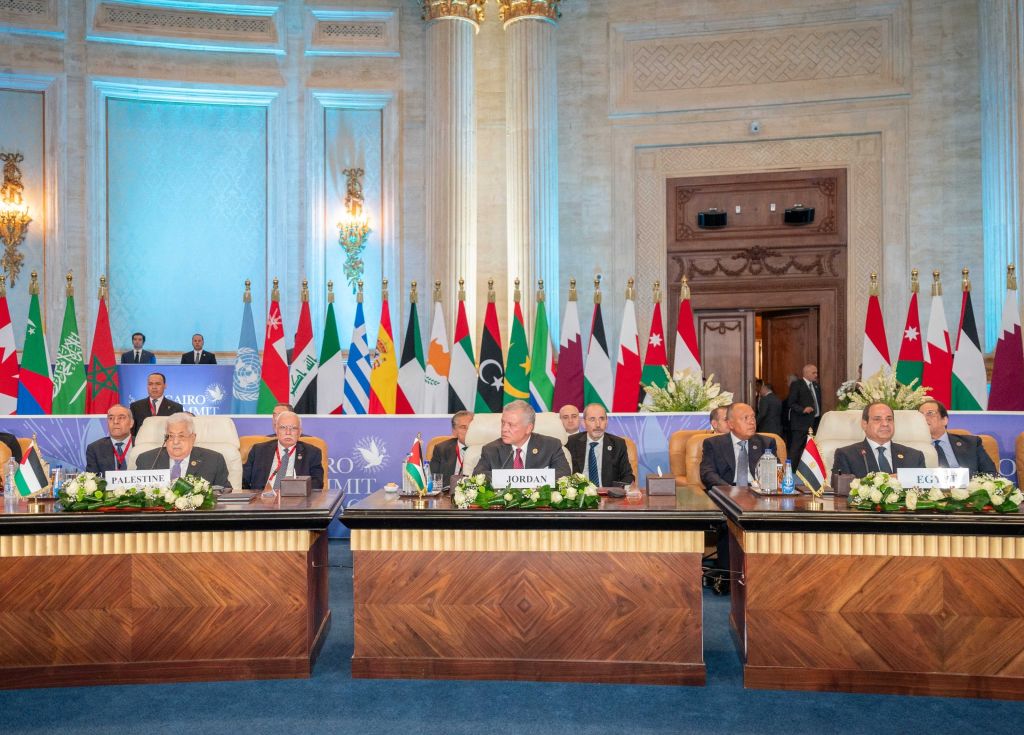
As death and devastation mount in the Israel-Hamas War, the bloodiest resurgence in decades of an intractable conflict, Egypt called together world leaders in Cairo in a summit on Saturday to try to negotiate a ceasefire and ensure humanitarian aid.
But missing were the warring parties themselves, leading politicians and experts to cast doubt the summit would make a difference even before it started.
The summit fell two weeks after Hamas, the Palestinian militant group governing Gaza, invaded Israel, killing 1,400 people and taking 200 hostages, Israeli authorities said.
Israel is now preparing for a ground invasion after cutting off Gaza’s aid and electricity and relentlessly bombing the territory, killing at least 4,385 Palestinians, the Hamas-run health ministry said.
On the same day as the summit, 20 aid trucks carrying food, water and medicine rolled into the besieged strip through Egypt’s Rafah crossing after days of diplomatic wrangling.
The United Nations said the aid wasn’t enough: Previously, 100 trucks a day entered the strip to help more than two million people. The few new trucks also carried no fuel, which aid organizations said was critical to keep hospital generators running and to clean water.
European leaders—tightroping politically between supporting Israel and preserving humanitarian rights in Gaza – had debated whether to attend the peace summit, the Financial Times reported.
Find out what happened in Cairo when the world leaders gathered.
Who was at the Cairo Peace Summit?
Attendees at the summit included Mahmoud Abbas, president of the Palestinian Authority that governs the West Bank, and the leaders of Jordan, Iraq and most Gulf countries.
Many European nations sent their heads or foreign ministers, as well as the European Council and European Union. Representatives also came from Russia, South Africa, China and Japan.
United Nations Secretary-General António Guterres, who visited Egypt’s border with Gaza the day before the summit to beg for the opening of the Rafah crossing to allow in humanitarian aid, also attended.
Missing from the table were the warring parties and another key player, Iran. Iran matters because it has funded both Hamas and Hezbollah, a Lebanese militant group engaging in skirmishes with Israeli troops on the border of those two countries.
A Lebanese politician told Politico the summit probably wouldn’t have any impact because of those absences.
The U.S. sent the Chargé d'Affaires ambassador from its Egypt embassy, but no senior officials from President Joe Biden’s administration. Biden, a longtime ally of Israel, has advocated for Israel’s right to defend itself after Hamas’ attack, although he warned Israel not to be consumed by rage in its response.
This week, the U.S. vetoed a United Nations resolution this week calling for a pause in the fighting to allow humanitarian assistance into Gaza, with a representative arguing it didn’t mention Israel’s self-defense.
Two days later, Biden took credit on social media for brokering the deal to send aid into Gaza, and for Hamas’ release of two American hostages, which was negotiated by Qatar’s government.
What did world leaders say?
Leaders largely covered how they might end the war, protect civilians, release hostages, deliver humanitarian aid, and work to a two-state solution for Israelis and Palestinians.
“The grievances of the Palestinian people are legitimate and long,” Guterres said. “Nothing can justify the reprehensible attack by Hamas that terrorized Israeli citizens, and those unwarranted attacks can never justify the collective punishment of the Palestinian people.”
Arab leaders, including Abbas, Egyptian President Abdel Fattah al-Sisi and Jordan’s King Abdullah, strongly criticized Israel’s siege of Gaza and forced displacement of Palestinians.
Abdullah condemned violence against all civilians in Israel, Gaza and the West Bank. He called the bombing of Gaza “cruel and unconscionable on every level.”
“It is a collective punishment of a besieged and helpless people,” he said. “It is a flagrant violation of international humanitarian law. It is a war crime.”
Western leaders were more measured in their comments against Israel, while expressing their concern for civilians and the humanitarian crisis.
As up to 100,000 pro-Palestinian protesters marched through London’s streets to demand an end to the siege of Gaza, U.K. Foreign Secretary James Cleverly told the summit he’s spoken directly to the Israeli government about its duty to respect international law and preserve civilian lives in Gaza.
"Despite the incredibly difficult circumstances, I have called for discipline and professionalism and restraint from the Israeli military,” Cleverly said.
Canada’s Foreign Affairs Minister Mélanie Joly said “we support Israel’s right to self-defense in accordance with international law,” while raising alarm about the humanitarian disaster in Gaza.
Joly said she, and many other leaders, were also worried about war spreading beyond Israel and Gaza—and expressed concern about the role of Iran, absent at the table, and the actions of its proxies.
Hamas reportedly said it followed the summit “with interest," in a statement that appeared on Telegram.
“We appreciate all efforts exerted to stop the Israeli aggression on our people, and we appreciate, as well, all supportive stances by the countries during the summit which backed the rights of the Palestinian people and their resistance and rejected the Israeli planned intention of expelling our people,” the statement read.
TIME has reached out to the Israeli Ministry of Foreign Affairs via email for comment regarding its absence and view on the summit.
What did the summit accomplish?
The warring parties and their backers weren’t there, and world leaders did not release a joint statement at the end of the summit, showing a divide. This means there are no firm documented goals to work toward or pressures to put on either side.
More Must-Reads from TIME
- How Donald Trump Won
- The Best Inventions of 2024
- Why Sleep Is the Key to Living Longer
- Robert Zemeckis Just Wants to Move You
- How to Break 8 Toxic Communication Habits
- Nicola Coughlan Bet on Herself—And Won
- Why Vinegar Is So Good for You
- Meet TIME's Newest Class of Next Generation Leaders
Contact us at letters@time.com